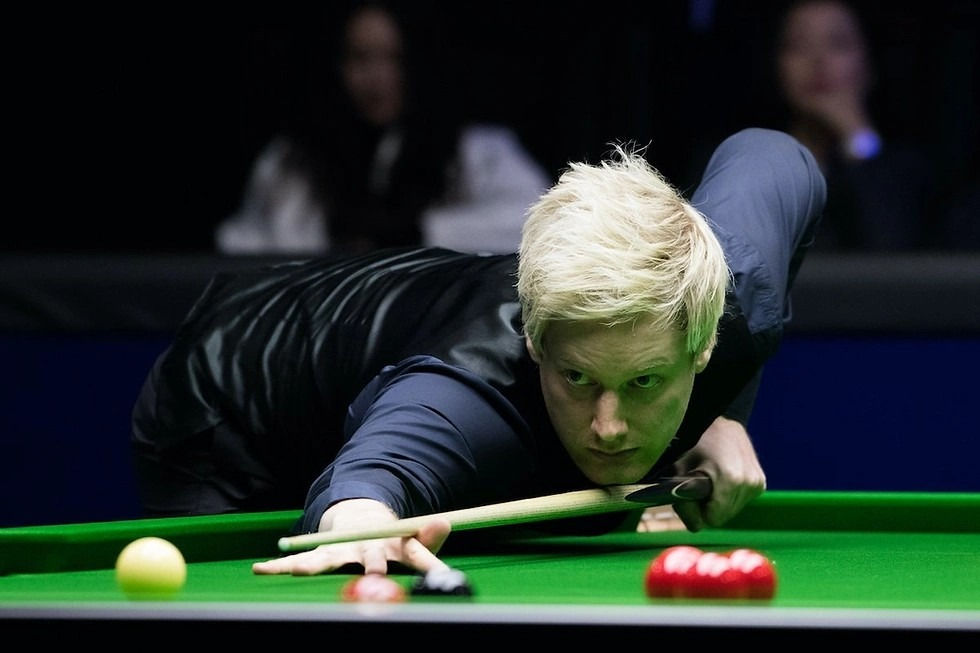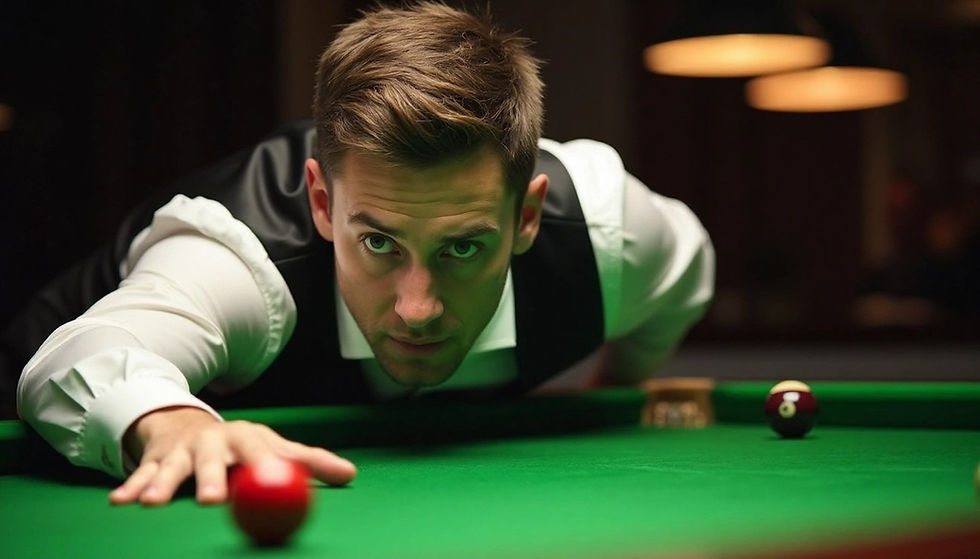How to Master Snooker Mental Preparation: A Pro Player's Guide
- Dr Paul McCarthy

- Sep 23, 2025
- 7 min read

Did you know that snooker mental preparation can make the difference between winning and losing a match?
Physical skill is just half the battle in snooker. The game just needs high-level strategic thinking and knowing how to think several shots ahead while adapting to changing table conditions. Champions like Stephen Hendry, with seven World Championship titles, show that mental resilience and strategic thinking are essential to succeed at the highest level.
Performance anxiety hits hard in snooker, especially when you have to coordinate multiple muscles with minimal room for error. A simple miss can leave you sitting in your chair while your opponent takes your points. Every serious player should prioritize developing snooker mental strength.
This piece will share professional-level techniques to change your approach if you struggle with concentration under pressure or want to improve your snooker mental game. We'll cover practical snooker mental tips that have helped top players stay focused during crucial moments. You'll learn everything from building a strong mental foundation to creating effective pre-shot routines.
Let's head over to the strategies that will lift your performance beyond mere technical skill.
Build a Strong Mental Foundation
The foundation of excellent snooker mental preparation starts with deliberate groundwork. Mental resilience doesn't happen overnight—you must practice it as much as your technical skills.
Create clear goals for your snooker experience
Specific targets give your practice purpose and direction. Measurable objectives provide clear pathways that motivate you to improve [1]. To cite an instance:
Want to achieve a specific number of century breaks in a season
Improve your pot success rate by a defined percentage
Become skilled at particular positional play techniques
Your commitment becomes stronger when you write down these goals. Start small and track your progress weekly. Remember that setbacks naturally occur during the process [2]. This creates your improvement roadmap and lets you celebrate small wins that boost confidence.
Use visualization to rehearse success
Visualization stands as the most powerful mental technique any snooker player can use. My practice involves mentally rehearsing successful shots and scenarios before taking them.
Research proves fascinating results about mental practice. Basketball players who only visualized free throws improved by 23%, while those who practiced physically showed 24% improvement [3]. This happens because your brain creates identical neural pathways during visualization and actual practice—it can't distinguish between reality and vivid imagination [2].
Picture the entire process of each shot to make this work. See yourself approach the table and execute perfect technique. Watch the cue ball's path, feel the smooth stroke, and see the object ball drop right into the pocket [4].
Know the role of snooker mental strength
Mental resilience helps players thrive under pressure in snooker. Match outcomes often depend on psychological factors. Players with confidence and mental toughness win more games [5].
Professional players dedicate much time to mental training. The game demands complete focus since each shot matters [5]. Players who block distractions execute their strategy better, especially during crucial moments.
Building mental toughness might challenge you at first. Regular practice will help you develop the psychological foundation you need to succeed in competitions.
Create a Consistent Pre-Shot Routine
A pre-shot routine is the life-blood of effective snooker mental preparation. Players at the professional level know that being consistent before each shot builds a psychological framework that supports peak performance.
Steps to build your own routine
Building an effective routine needs your personal touch. The first step is to stand behind your shot's line to see the right path and contact point [6]. Picture "train tracks" guiding your cue ball to its target. Next, look three shots ahead instead of just the current pot [6]. Then, pick the exact spot to hit your cue ball and the power needed for proper position [6].
Your routine should include:
Table situation assessment (score, confidence level)
Cue chalking when needed
Complete commitment to your chosen shot [7]
Note that your performance takes a hit when you doubt your decision while down on the shot [7]. Stand up and take another look if uncertainty creeps in rather than shooting with doubt.
How routines reduce pressure and distractions
Pre-shot routines act as mental anchors when pressure runs high. They offer familiar ground in stressful competitions. A steady routine helps you stay focused by cutting out distractions and bringing calmness before each shot [8].
Your routine becomes a safe haven from mental pressure during matches. You naturally feel less anxious when you focus on the process rather than worry about results [8]. Yes, it is impossible to separate snooker's physical aspects from the mental—they work together [9].
Examples from professional players
Mark Selby, the world champion, shows why consistency matters. He follows the same pattern whatever the shot's difficulty: pointing his cue, making tiny adjustments for proper aim, then executing with a "one-two" rhythm [9]. This steadfast dedication drives his success at snooker's highest levels.
Professional players have their own approaches, but they share similar preparation patterns [7]. Some focus on stance, others on how they line up their cue. Many use breathing techniques—they breathe in during setup and slowly out while feathering and striking to stay still [10].
The best routine is one that feels natural to you with practice. As you develop it, the routine will become automatic and help you find better flow in your game [7].
Train Your Mind Like a Muscle
Physical abilities need consistent training, and your snooker mental game just needs regular exercise. Mental skills deteriorate without practice but flourish with proper attention.
Practice mindfulness to stay in the moment
Focus on the present moment makes all the difference in snooker. Elite players stay connected with each shot instead of thinking about past mistakes or future outcomes [1]. This mental discipline anchors players and helps them fine-tune after unexpected game turns [11]. Mindfulness practice enhances your table observation with heightened awareness. You notice colors, textures, and sounds that ground you in the present [4].
Use breathing techniques to manage nerves
Controlled breathing steadies nerves and will give smooth execution. Box breathing works great to calm nerves during high-pressure moments - inhale for 4 seconds, hold for 4, exhale for 4, and hold again for 4 [12]. Deep, regulated breathing triggers your parasympathetic nervous system. This promotes relaxation and mental clarity [12]. Research shows that slow, considered breathing reduces cortisol levels and steadies hands [12].
Incorporate positive self-talk and affirmations
Positive thinking is the life-blood of snooker mental strength. Replace negative self-talk with encouraging statements that boost your abilities [4]. Of course, these mental disciplines build resilience and sharpen focus [11]. Top players use visualization techniques. They celebrate successful shots before taking them and create mental blueprints to win [11].
Track your progress with a snooker journal
A snooker diary impacts your game's improvement directly. Patterns surface quickly and show your strengths and areas that need work [13]. Valuable insights slip away between sessions without proper documentation [14]. Your journal becomes both coach and witness throughout your snooker mental preparation trip.
Practice With Purpose and Focus
Purposeful practice is crucial to snooker mental preparation. Random ball-hitting might pass the time, but champions are built through strategic practice.
Design mental drills for practice sessions
Your improvement will speed up when you set specific targets for each practice session [14]. A well-laid-out approach should include:
Different routines that cover all game aspects
Score tracking systems to measure progress
Shot conversion targets between 30-40%
Practice routines with competitive elements help you stay focused and create accountability [14]. You can track your progress by keeping score and measuring improvement as time passes.
Simulate match pressure during training
Your snooker mental strength grows when you practice under match-like conditions [8]. Playing competitive games with friends creates pressure that prepares you for tournaments [8]. Players who face different playing styles adapt better to pressure scenarios [8].
Avoid comfort-hitting and build intent
Comfort-hitting wastes practice time when you hit balls without purpose [14]. Smart players go to the club with a clear plan [14]. Practice becomes non-negotiable when specific aspects of your game let you down in matches [14].
The real difference between casual players and professionals isn't about how long they practice - it's about quality [15]. Your snooker mental game improves faster through deliberate practice than spending mindless hours at the table.
Conclusion on Mental Preparation in Snooker
The mental side of snooker sets professional players apart from amateurs. Technical skills can take you only so far without the mental resilience to execute under pressure. My years in competitive snooker taught me that mental preparation isn't optional - you need it for consistent performance.
These strategies work together as a detailed system. You must build your mental foundation through clear goal-setting and visualization. A consistent pre-shot routine should become automatic. On top of that, it helps to train your mind through mindfulness, breathing exercises, and positive self-talk. Practice with purpose instead of just hitting balls around the table.
Players often underestimate how their mental state affects their game. They focus only on cue action and technique while ignoring the psychological aspects that determine match outcomes. Your mind controls your muscles - this basic truth applies to every shot you take.
Mental toughness needs patience to develop. Without doubt, you'll face challenges, but each mental practice session makes you more resilient. The professional players you admire didn't become mentally tough overnight. They committed to daily mental training along with their physical practice.
Your path to mental strength begins today. Try these strategies in your next practice session and track your progress. You might not see changes right away, but in a few weeks, you'll notice better consistency, improved focus under pressure, and end up winning more frames. The table awaits - bring both technical skill and mental strength to it.
Key Takeaways
Mental preparation is just as crucial as technical skill in snooker, with the psychological game often determining match outcomes between equally skilled players.
• Build mental foundations through goal-setting and visualization - Set specific, measurable targets and mentally rehearse successful shots to create neural pathways for success.
• Develop a consistent pre-shot routine - Create a personalized sequence that includes shot visualization, planning three shots ahead, and full commitment to reduce pressure and distractions.
• Train your mind daily like a physical muscle - Practice mindfulness, use breathing techniques like box breathing, and incorporate positive self-talk to build mental resilience.
• Practice with deliberate intent, not comfort-hitting - Design structured drills with scoring systems and simulate match pressure to maximize improvement and build competitive mental strength.
• Track progress through journaling - Document your mental game experiences to identify patterns, celebrate improvements, and maintain accountability in your development.
The difference between amateur and professional players lies not just in technical ability, but in mental toughness developed through consistent psychological training alongside physical practice.
References
[1] - https://snookerhub.co.uk/the-mental-game-of-snooker-strategies-for-improving-focus-and-concentration-on-the-table/[2] - https://snookerzone.co.uk/part-2-of-2022-snookercoaching-questions-mental-training/[3] - https://www.pooldawg.com/article/the-power-of-visualization/?srsltid=AfmBOopUfOfvkuLAACkmHVQUph3qGCNOmOvJwKU7y_BKRJCiMFRXS69V[4] - https://www.cueballchronicles.com/post/snooker-mental-tips-how-mental-toughness-affects-performance[5] - https://www.cueandcase.co.uk/blogs/blog/is-snooker-a-mental-game?srsltid=AfmBOooGyiMzbAGdz-TAVqLQClkNVNWIIWt7tbzKYTgAXazwWiB4Fec1[6] - https://www.youtube.com/watch?v=_JpwKrzVcL4[7] - https://www.snookercanada.ca/2019/06/pre-shot-routine/[8] - https://news.ayozat.com/story/how-to-handle-pressure-in-snooker-matches[9] - https://www.youtube.com/watch?v=fi8JnUlmhwA[10] - https://www.thesnookerforum.co.uk/board/forum/snooker-forums/coaching-questions/44660-pre-shot-routine[11] - https://snookerpot.com/the-psychology-of-snooker/[12] - https://ilovesnooker.in/breath-control-in-snooker-your-key-to-precision/[13] - https://offthestreet.org.uk/7-tips-to-improve-your-snooker-game/[14] - https://snookerme.com/practice/snooker-mental-tips/[15] - https://markrichardcues.com/blogs/news/snooker-skills-and-techniques-every-beginner-should-master?srsltid=AfmBOoqqFXWqgz23jcni6BV2DzMtCQFjLk4aX4NWV-xz4VL21mMTZSIU


